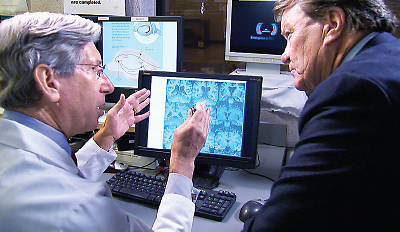Psychosis and its relationship to violence was the subject of nationwide attention when the award-winning news show “60 Minutes” featured a report on the subject in late September.
The 13-minute segment, hosted by reporter Steve Kroft, featured commentary from APA President Jeffrey Lieberman, M.D. He showed Kroft and the television audience brain images demonstrating that schizophrenia and related psychotic disorders are diseases of the brain, resulting in crucial structural anomalies.
The segment also featured commentary by psychiatrist E. Fuller Torrey, M.D., who has for years been a strong advocate for treatment of schizophrenia as a brain disease. The report, which also included interviews with patients and family members, reviewed the recent history of mental health policy in the United States, including the closure of state hospitals in the mid-20th century and the policy of deinstitutionalization. Moreover, the segment examined the relationship between schizophrenia and violence, emphasizing that individuals who are receiving treatment are not more likely to be violent than the general population—but that those individuals who are not receiving treatment may be.
“I thought the segment was very, very good,” Lieberman told Psychiatric News. “The reporter and producers were able to weave together threads from three different stories that are important to tell. One of those is the fact that schizophrenia and related psychotic disorders are brain diseases that affect people’s mental function and behavior and can cause people to do things that are strange and unusual and—tragically—potentially violent. But these actions are not completely under the patient’s control, and so the report communicated to the public that this is a ‘no-fault’ disease—no fault of the family and no fault of the patient.”
The second thread of the story, Lieberman said, is that mental health services are inadequate. “The report showed that we don’t have enough commitment to provide support and care for the substantial number of people with severe mental illness in our country.”
Finally, “60 Minutes” took on the controversial subject of violence. “The third important thread of this story was that these periodic and shocking acts of mass violence are disproportionately caused by people with mental illness who have not gotten treatment,” Lieberman said. “But that this potential for violence is completely preventable when patients get good care in a timely fashion.”
Lieberman said the producers indicated an interest in following up on the subject with further in-depth reporting.
“I was delighted that ‘60 Minutes’ did such a good job dealing with a complex and controversial topic. And I appreciated that the producers went beyond just doing what they thought would be a popular story segment, but had a genuine interest in the story to the point that they indicated their interest in doing a follow-up story.” ■

